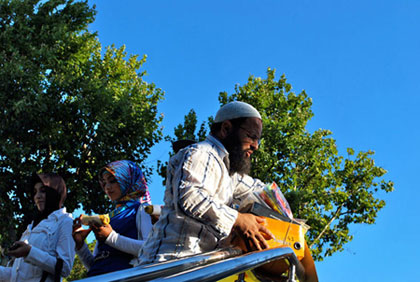 |
| dilettarsi | pensare | sorridere | le rubrilie | news | pubbliredazionali | contatti |

Il periodico
Dopo una laboriosa (e avventurosa) preparazione, a ottobre 2009 esce il numero zero di www.possibilia.eu periodico online per curiosi. Una realizzazione che riflette l'orizzonte libero e senza preconcetti della nostra linea editoriale.
Da subito, un gruppo di autori aderisce al progetto, alcuni dei quali formano il nucleo redazionale più stabile.
Possibilia si non si propone di fare informazione in senso stretto: tante altre testate più veloci e attrezzate ricoprono già questo ruolo. La nostra rivista desidera offrire ai suoi lettori contenuti insoliti, dando diritto di cittadinanza a temi o chiavi di lettura spesso trascurati o snobbati. Un periodico generalista a 360 gradi? Solo in parte. Possibilia non funziona per compartimenti tematici, ma per modalità di approccio alla materia. Accoglie così una sezione per Dilettarsi, una per Pensare e una per Sorridere. Si aggiungono una sezione di News - la sezione “d'attualità” della testata - e una sezione destinata ai Pubbliredazionali, con lo scrupolo di mantenere eticamente distinti contenuti commerciali e redazionali, valorizzando così entrambi.
Con la nuova versione della rivista, inaugurata nel 2012, abbiamo deciso di aggiungere una sezione (le Rubrilie) dedicata alle nostre passioni: il vino, il rugby e il viaggio.
Contatta la redazione: redazione@possibilia.eu
I libri
Nel 2010, gli esiti incoraggianti della rivista e il desiderio di ampliare il progetto editoriale dànno vita alla parte cartacea della nostra attività.
Vai a www.possibiliaeditore.eu
|
|||
The expression “To smoke like a Turk” is one of the most abused clichés in history. And rightly so: Turks really do smoke like Turks, that is a lot. Beyond word games and perceived truths, real or imagined, it's fair to say that an expression loses credibility when undermined by a fundamental paradox. In this case the paradox can be found in a piece of legislation enacted in July 2009 which bans smoking in all indoor public spaces. Whilst this has by no means pleased the Turks, it has done little to disturb their natural aplomb and the phlegmatic nature of the people. A few months in from the law being passed, though, and there are no signs of it being flouted. It's not that the penalty for breaking the law are likely to deter people, given that it consists of a fine of around 70 Turkish lira (circa 30 Euros). It's a long way from past times, when Turkish smokers were given a really hard time. To give you an example of a slightly more onerous law, at the beginning of the 17th Century sultan Muradiv decided that smoking should be punishable by decapitation; they weren't big on subtlety in those days. It's unlikely, then, that this little fine will have much of an effect on the Turks who are used to literally risking their necks for a smoke. Returning to modern Turkey, one of the reasons for the ban being observed is almost certainly the hot summer during which it came into effect, as well as the natural predisposition of the Turks to socialise outdoors. Perhaps this will change come winter, as they flock to tabac café for the regular, interminable rounds of backgammon during which smoking is considered a subset of the standard rules. Not that it matters. A people is also defined by its vices, which are not always directly proportional to its virtues. And if the Turks can be said to have the twin vices of smoking and consumption of litres of cay (traditional Turkish tea), they have the virtue of being able to cope with things, of bending the rules with a smile, and turning their contradictions into an art form. In the alleyways of Istanbul, for example, amongst its overcrowded residential areas, sprawling across two continents, contradiction has truly found a home. It's certainly easier to say what Istanbul is not, given that defining it is a struggle even for those Turks who live there (not that they would care to do so, in any case). It's a place where opposites can coexist peacefully, given that there's space for everyone. Where it's possible to find oneself drunk on raki in the mid afternoon only to lift one's eyes and see a majestic mosque, whilst beautiful women with flowing hair flaunt their looks as they pass arm-in-arm with other women wearing the veils prescribed by Islamic law. In a city where one can quickly move from Sultanahmet, an historic area, home of sultans, full of mosques and tradition, to Beyoglu, home of artists and musicians and full of late-night life which puts Barcelona's Las Ramblas to shame. A place where besuited businessmen can mix with those who'd do almost anything to avoid having a 'real' job. Like flogging tickets to unlikely lotteries from café to café, taking a pair of scales into the street to weigh passers-by, catching poisoned fish from Galata Bridge, offering the opportunity to shoot air rifles at strings of balloons tied to the banks of the Bosphorous, challenging improbable winds... A country like this can happily maintain the highest rate of tobacco consumption in the world whilst at the same time passing legislation banning smoking in all indoor public areas. Nothing strange, nothing contradictory; it's simply Turkey. Stefano Gianuario was born in Milan, Italy, in 1985. He works as a freelance journalist, writes upon tourism and music. He plays in the noise band Hezel. In 2004 he published the novel Le cose di Jack |
www.possibilia.eu - Possibilia Editore - Tutti i diritti riservati - Iscrizione Registro degli Operatori di Comunicazione n.18618

